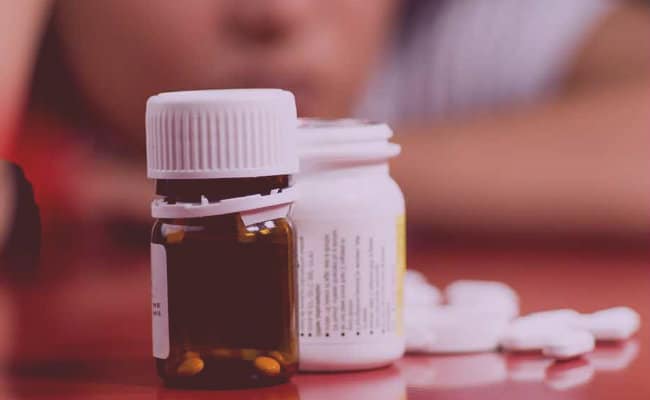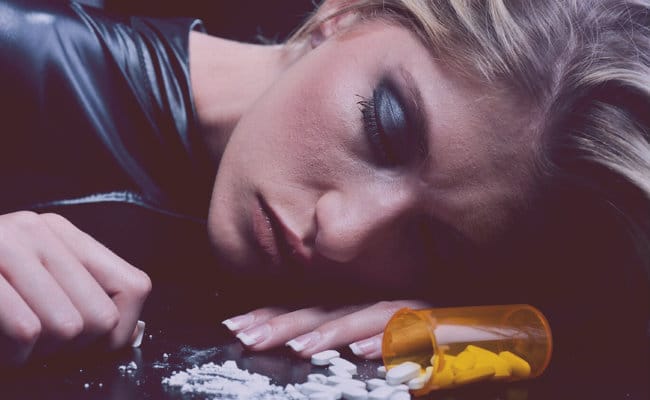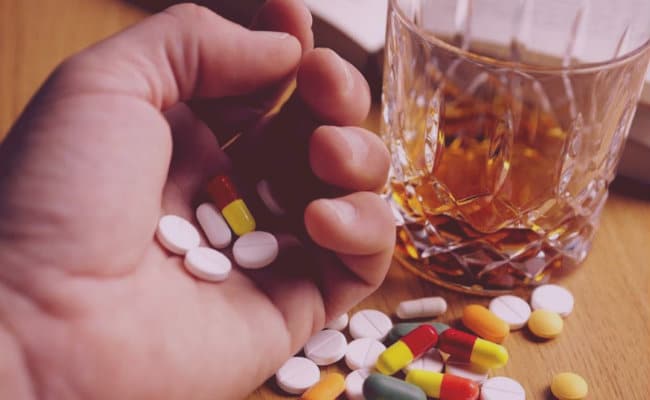Depressant drugs increasingly affect society, although its consumption is less than the stimulant drug, it continues to wreak havoc on the internal problems of countries.
Some people use this type of drug to get some benefit that gives them peace of mind and makes them avoid the problems of their day to day, in other instances the purpose of its creation was to be able to provide patients in serious health with the reduction of pain and suffering caused by various diseases.
What are drugs?
In the medicinal field, the term drug refers to the substance used to heal or cure some serious health factor.
In colloquial terms the word drug refers to psychoactive substances of illegal use.
The drug can modify the sensations, thoughts and emotions of the individual who consumes it, this lethal substance causes addiction and can be fatal.
Addiction occurs thanks to hormones that the brain secretes and that produce pleasure, which are spread when the person uses any type of drug.
The need to consume becomes more and more constant creating a state of dependence and addiction in the individual.

What is a depressant?
It is a chemical that directly affects the functions of the brain and decreases the activities of the central nervous system.
They are used in medicine as sleeping pills, sedatives, and pain relievers, their use should always be supervised by a specialist.
On the other hand, they are used for non-therapeutic purposes that affect the life of the person who consumes them, generally the individual gets the depressants illegally who will produce a strong dependence and addiction in the long term.
Addiction to this type of medication is mostly caused by some sentimental or psychological imbalance present in the functions of those who suffer from it.
The need to avoid daily problems is the main cause of addiction to this type of medication.
What are depressant drugs?
Since you know the terms "drug" and "depressor"We proceed to explain what depressant drugs are: these types of substances are directly related to the functions of the nervous system.
This type of drug is provided legally by psychologists, psychiatrists and other health professionals to reduce the effects of depression and anxiety, sometimes the patient has the powers to self-medicate, however they continue to have regular medical supervision.
The problem with the existence of this type of drug is the illicit use that some people give it, either for enrichment or for constant consumption.
Depressant drugs are part of the social ills, although it is true that contemporaneity has given huge contributions to the world of medicine, however, it has brought as a consequence that people with bad behavior have access to the consumption of this type of narcotic.
Cases such as marijuana and cocaine are examples of depressant drugs that directly affect the central nervous system.
Features
It is necessary to take into account that depressant drugs directly affect brain function and the central nervous system.
These types of substances can atrophy brain tissues and even decrease its proportions.
Although not all types of depressants cause the same symptoms, such as alcohol, which does not share the same characteristics as heroin or marijuana, it does decrease the addict's brain activity.
Origins of this type of drug
The exact origins of these types of drugs are not put in a specific time period. It is known that since ancient times the use of the marijuana leaf and other drugs extracted from nature were included in various rituals of a magical or medicinal nature.

Effects
Each of the different depressant substances has different effects therefore they tend to have certain variations in them, however they may share some side effects with each other.
In all cases, the functioning of the brain is directly affected by the consumption of depressant narcotic drugs.
In addition to the strong addiction that the person suffers with respect to depressant drugs, there are other side effects that manifest themselves both in the long and short term such as:
Short term
The main effect produced by depressant drugs is the slowness of brain function and this same factor is what decreases stimulation of the central nervous system of the addict.
Depressant drugs in high doses can cause symptoms such as fatigue, dizziness, and decreased attention.
The inability to speak properly is evident within the after-effects of drugs.
Physiological symptoms can also appear among them are diarrhea, difficulty and burning to urinate, pupil dilation and fever.
Long-term
These are the ones that have the greatest impact on people's health, the long-term effects can prevent a full life for addicts of depressant drugs; dependence on them has multiple effects that can remain over time even being treated.
For this reason, it is important to emphasize that people's growth is as responsible as possible, to avoid these types of risks in the future, which directly affect the different social components.
Types of depressant drugs
There are different types of depressant drugs, they are classified according to the effects they cause and the severity of dependence, among them we find the following:
Opiates
They are substances that are extracted from seeds and plants grown mainly in South America, Asia and Africa.
The poppy and roost are the names of the plants that have this type of substances. The alkaloids belonging to opium are those that are extracted from it to make the composition of depressant drugs.
This term is used incorrectly to refer to all drugs that have such effects as those present in morphine.
La morphine, codeine and thebaine They are the main chemical components made up of opiates, although they do not have an effect directly on the central nervous system, they still belong to oppressive drugs.
Heroin
This type of drug can be consumed intravenously or smoked, its universal use and is the cause of most addictions in the world.
The side effects of heroin include: decreased eyesight, dizziness, addiction, feelings of euphoria, long periods of pleasure similar to or stronger than orgasm, relaxation, and hyperactivity.
Oxycodone
It is a substance frequently used mostly in the American population, it is a semisynthetic opiate which is derived from thebina. The relatively easy extraction and composition of the drug make it accessible to all types of audiences.
Its effects are similar and even stronger than those of heroin, it can sometimes cause seizures.

methadone
This drug is also sold commercially and legally under the name of dolofin. Ironically, the objective of its creation was to supply this drug to patients with a strong addiction to heroin.
It is a synthetic drug of German origin that has side effects such as: constipation, respiratory depression, bradycardia, pupil dilation, increased body temperature and blood glucose concentration.
Kraton
This plant is a coffee family, it is a very versatile drug that has endless health benefits, however, it can cause strong states of dependence due to the side effects it has; this depressant drug is a narcotic used as a substitute for opium
Ethyl alcohol
It is most consumed in the world population that has a sweet and addictive taste. Ethyl alcohol is obtained by fermenting the glucose from the fruits.
The supply of alcohol is always oral and the intake always tends to slow down the digestive system. It takes a few hours for the body to assimilate it. Sometimes this does not happen and the body's defenses are intoxicated.
Large amounts of alcohol cause damage to the various organs of the body such as the stomach, liver, kidneys, brain and other vital components such as blood.
The effects of alcohol vary according to the dose that the person consumes, they also influence the psychological state of the consumer, generating effects of pleasure that make them evade reality and problems.
The motor functions of the addict are affected by the alcohol consumption, it can interfere with body functions causing motor impairments.
On an emotional and psychological level, alcohol can bring great consequences which are not momentarily visible to the person who consumes it.
carisoprodol
It is used as muscle relaxant which causes drowsiness effects, is implemented in conventional medicine to relieve strong muscle strains and other conditions related to muscle pain.
Abuse of this drug by the addicted person can lead to fatal consequences such as overdose or heart attacks. It is not a drug that requires a prescription, therefore, all kinds of people have access to it.
Barbiturates
It is an acid implemented to achieve relaxation and pleasure effects. It is used medically to prevent seizures, as an anesthetic sedative, and as a sedative.
This medicine does have a strict prescription, and must be supplied by a specialist.
Benzodiazepines
They are hypnotic-sedative substances that act directly on the central nervous system. It is used in medicine to calm depressive disorders, anxiety and even hyperactivity.
The abuse of this type of substances has side effects such as motor disability, and degradation of brain functions.
GHB
Better known as liquid ecstasy, this acid appears in berries and as a fermentation product applied to wine and beer. In non-medicinal use it is consumed in liquid form. It is very strong for the patient addicted to this type of drug, since it produces effects such as euphoria and hypersensitization of the senses.
What factors cause drug addiction?
There are various causes that affect the full and balanced development of beings suffering from drug addiction.
The family factor influences from the growth and learning of the individual, the values with which he grows up are fundamental for the healthy coexistence of the same with the environment, the person who is born into a family with few positive values can possibly fall into addiction in the drugs
That is why the upbringing of the child has a lot of weight on the future of the same, sometimes the abandonment of one of the parents or both is the cause of drug addiction.
On the other hand, if the child's father or mother has drug-related history, It can affect the development of the baby causing him some disability or failing that, in adulthood he is prone to being addicted to drugs.
However, it is not possible to be sure exactly what are the reasons that induce a person to become addicted to drugs.
In adulthood, an individual is capable of deciding whether to agree to consume this type of narcotic drug, since the reasons may be intrinsically related to spiritual or psychological feeling.
What are the possible reasons for addiction?
In general, a person can become addicted to drugs thanks to the side effects that it produces when consumed and also for the following reasons:
- To feel good: the sense of pleasure and tranquility that the brain experiences is one of the reasons why a person becomes addicted to drugs.
- To "perform" better: Disorders such as anxiety, stress or depression can be reasons for a person to become addicted to drugs. The prompt consumption of narcotic drugs makes these types of discomforts reduce or disappear momentarily from the life of the addict.
- Because others do: In adolescence it often happens that the person feels socially pressured and therefore agrees to consume this type of substances without first discerning if doing this brings them any health benefits. This is why it is necessary to emphasize the education that is given to the child at home, it is recommended that parents communicate with him in a sincere and open way with him so that he can learn about the risks that drugs bring to his lifetime.